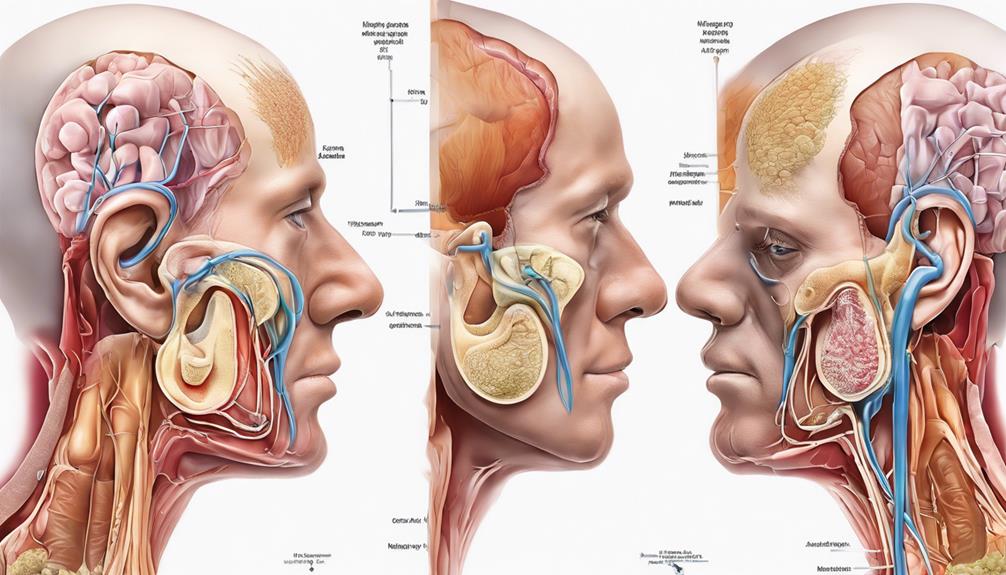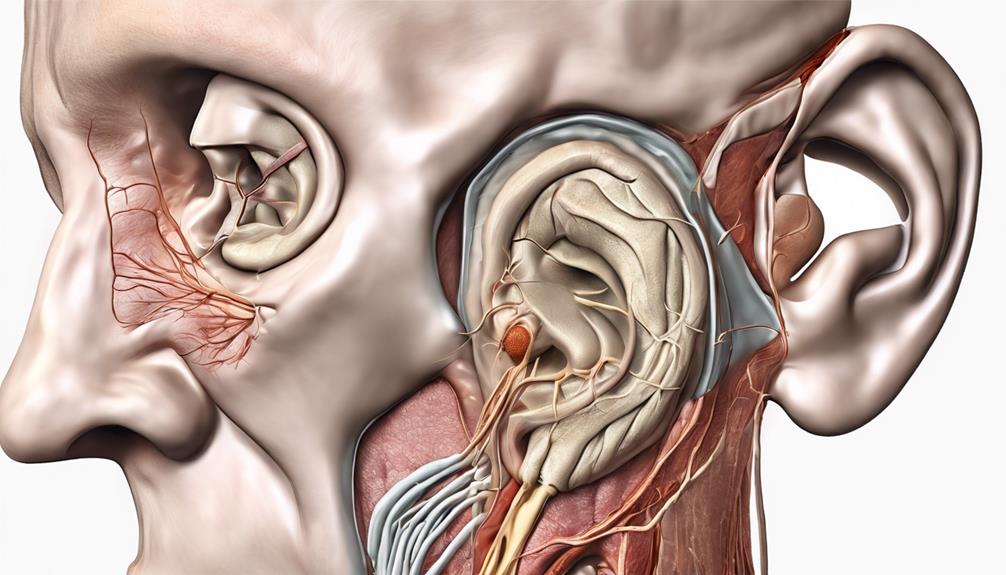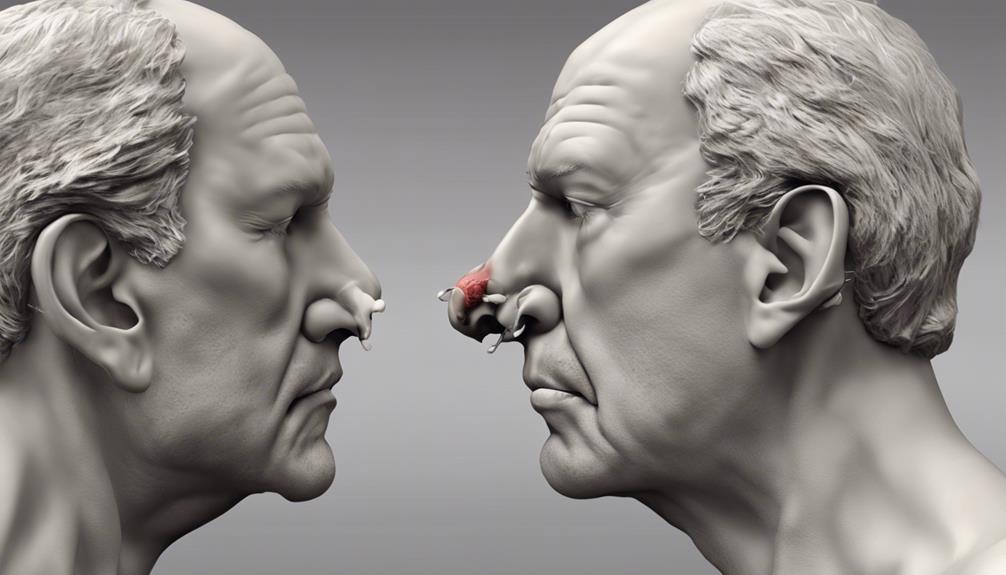Have you ever considered the various ways cancer can impact your hearing? From tumors that interfere with the auditory system to chemotherapy-induced hearing damage, cancer can lead to hearing loss through multiple pathways.
Exploring these ten ways can shed light on the complexities of this issue and help us understand the importance of early detection and intervention.
Key Takeaways
- Tumors in ear, brain, or auditory nerve disrupt sound signal transmission, causing hearing difficulties.
- Treatment like chemotherapy and radiation therapy can damage inner ear structures, leading to hearing loss.
- Cancer-related inflammation and autoimmune reactions can harm auditory nerves, worsening hearing problems.
- Stress from cancer impacts physiological responses, contributing to hearing issues; stress management is crucial for hearing health.
Tumor Growth Affecting Auditory System
When cancerous tumors develop in the auditory system, they can directly harm the structures responsible for hearing, leading to potential hearing loss. The growth of cancerous tumors in the ear, brain, or auditory nerve can disrupt the intricate auditory structures, affecting the transmission of sound signals to the brain. As these tumors enlarge, they exert pressure on the delicate auditory structures, potentially causing compression or invasion, which can result in varying degrees of hearing loss. Symptoms such as hearing difficulties, ringing in the ears (tinnitus), and dizziness may manifest due to the presence of these tumors in the auditory system.
Addressing cancer-related tumors affecting the auditory system often involves a multidisciplinary approach. Treatment options like surgery, radiation therapy, or chemotherapy may be recommended to target and reduce tumor growth. However, it's essential to consider that while these treatments aim to combat cancer, they can also impact hearing function due to their effects on the auditory structures. Balancing the management of cancer with preserving hearing health becomes crucial in such cases.
Chemotherapy-Induced Ototoxicity

Understanding the potential risks of chemotherapy-induced ototoxicity is crucial for individuals undergoing cancer treatment. Platinum drugs such as cisplatin and carboplatin are known to cause damage to the inner ear cells, leading to chemotherapy-induced hearing loss. This type of hearing loss can be permanent, especially affecting high-frequency hearing. Additionally, certain immune-targeted therapies used for melanoma treatment have also been linked to chemotherapy-induced ototoxicity.
To effectively manage chemotherapy-induced ototoxicity, regular monitoring of hearing is essential. Recognizing any changes early on and promptly communicating with healthcare providers can help in addressing potential hearing issues. By staying vigilant and proactive in monitoring and managing chemotherapy-induced hearing loss, individuals can mitigate the impact on their quality of life.
It's crucial for healthcare providers to be informed about these risks and to work closely with patients to ensure the best possible outcomes during cancer treatment.
Radiation Therapy Damage to Ear Structures
Radiation therapy poses a significant risk to the delicate structures of the ear, potentially causing irreversible hearing loss. High-energy radiation used in cancer treatment can damage the intricate hair cells within the inner ear responsible for translating sound vibrations into electrical signals for the brain to interpret. This damage can lead to sensorineural hearing loss, affecting the ability to perceive sounds clearly.
Additionally, radiation-induced alterations in blood flow to the inner ear can further contribute to hearing problems. The extent of hearing loss resulting from radiation therapy is closely related to factors such as the dosage administered, the duration of treatment, and the specific area targeted during therapy sessions.
Understanding the potential harm that radiation therapy can inflict on the ear structures underscores the importance of closely monitoring and addressing any emerging hearing issues during and after cancer treatment to mitigate the impact on the individual's quality of life.
Immunotherapy-Related Hearing Issues
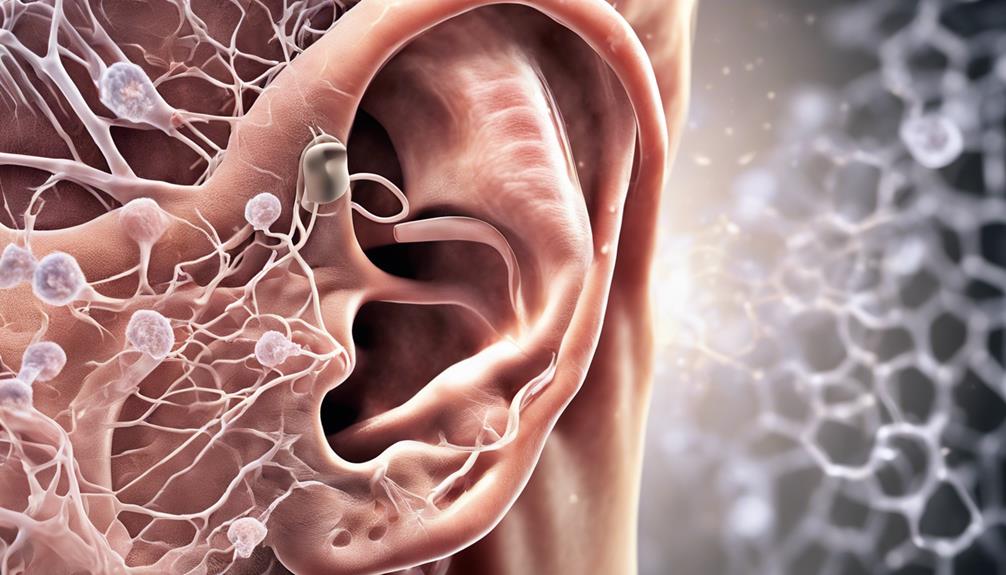
When undergoing immunotherapy for cancer, we mightn't realize that hearing issues could be a potential side effect.
It's crucial to be aware of this possibility and communicate any changes in hearing promptly with our healthcare team.
Understanding the impacts on the immune system, potential treatment side effects, and the importance of clear communication can help us navigate through any potential hearing challenges during cancer treatment.
Immune System Impact
Immunotherapy, a cutting-edge cancer treatment harnessing the body's immune system against cancer cells, poses a potential risk of hearing loss as a rare but significant side effect. When considering the immune system impact, certain immune checkpoint inhibitors such as pembrolizumab and nivolumab are linked to immune-related adverse events, including hearing loss.
The process of immunotherapy-related hearing issues is believed to involve inflammation or autoimmune reactions affecting the delicate structures of the ear. Monitoring for any signs of hearing problems during and after immunotherapy is vital for early detection and effective management of potential hearing loss.
Patients should promptly report any changes in their hearing or the presence of symptoms like tinnitus to their healthcare team for proper evaluation and intervention.
Treatment Side Effects
Understanding the potential side effects of cancer treatments like immunotherapy on hearing is crucial for patients navigating their healthcare journey. Immunotherapy, while effective against cancer, can lead to rare side effects such as hearing loss. Studies have reported instances of sudden sensorineural hearing loss following immunotherapy, with mechanisms possibly involving immune-mediated damage to inner ear structures. Patients undergoing immunotherapy should remain vigilant for any changes in their hearing and promptly communicate these to their healthcare providers.
Monitoring for hearing issues is essential, as early intervention can help manage immunotherapy-related hearing problems and reduce their long-term impact on quality of life. Stay proactive in monitoring your hearing during treatment to ensure the best possible outcomes.
Communication Challenges
Experiencing challenges in communication due to immunotherapy-related hearing issues can significantly impact daily interactions and overall quality of life.
- Difficulty in Understanding Speech: Immunotherapy-induced hearing problems may result in struggles to comprehend spoken words clearly.
- Impaired Conversational Follow-Up: Following conversations becomes challenging due to the impact on hearing clarity.
- Quality of Life Impact: Communication difficulties can lead to feelings of isolation and frustration in social settings.
Individuals undergoing immunotherapy should prioritize regular monitoring and open communication with healthcare providers to promptly address any emerging hearing concerns.
Metastasis to Ear or Brain
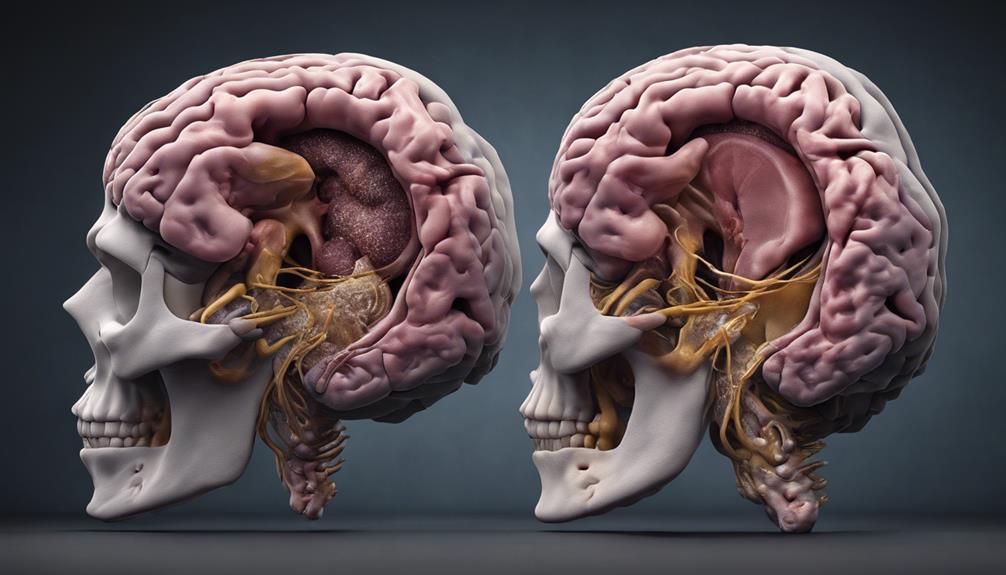
When cancer metastasizes to the ear or brain, it can significantly impact our hearing capabilities. Structures involved in hearing can be damaged, leading to various symptoms affecting our ability to hear.
It's essential to understand the symptoms, effects, and available treatments for metastatic cancer in these vital areas.
Ear Metastasis Symptoms
In cases of ear metastasis, where cancer spreads to the ear or brain, individuals may experience a range of symptoms including hearing loss, ear pain, ringing in the ears (tinnitus), vertigo, and facial weakness. These symptoms can be concerning and may indicate the need for further medical evaluation.
When facing ear metastasis, it's crucial to be aware of potential signs that may arise. Here are some key indicators:
- Sudden onset of hearing loss
- Persistent ear pain or discomfort
- Unexplained dizziness or imbalance
Recognizing these symptoms promptly and seeking appropriate medical attention is vital for an accurate diagnosis and timely treatment to address any underlying issues related to ear metastasis.
Impact on Hearing
How does cancer metastasis to the ear or brain impact one's hearing ability?
When cancer spreads to these areas, it can directly affect the auditory system, leading to hearing loss. Metastatic tumors in the ear or brain can disrupt the normal functioning of auditory nerves and structures, causing unilateral or bilateral hearing impairment based on the tumor's location and size. Symptoms of hearing loss due to cancer metastasis may manifest as a gradual or sudden onset of hearing difficulties, along with issues like tinnitus and imbalance.
Managing hearing loss caused by cancer metastasis involves addressing the primary cancer site and providing multidisciplinary care to mitigate the impact on the auditory system. It's crucial to tailor treatment plans that consider both the cancer and its effects on hearing.
Treatment Options Available
Cancer metastasis to the ear or brain necessitates a comprehensive approach to treatment, encompassing surgical interventions, radiation therapy, and chemotherapy to address the impact on hearing function.
When faced with metastasis to these critical areas, patients may undergo the following treatment options:
- Surgery: Removing tumors in the ear or brain that are affecting hearing function.
- Radiation Therapy: Targeting cancerous cells in the ear or brain to manage cancer-related hearing loss.
- Chemotherapy Drugs: Administering medications to treat metastasized cancer, potentially affecting hearing as a side effect.
Collaboration among oncologists, otolaryngologists, and audiologists is crucial for effectively addressing cancer-related hearing loss stemming from metastasis to the ear or brain.
Inflammation Impacting Auditory Nerves
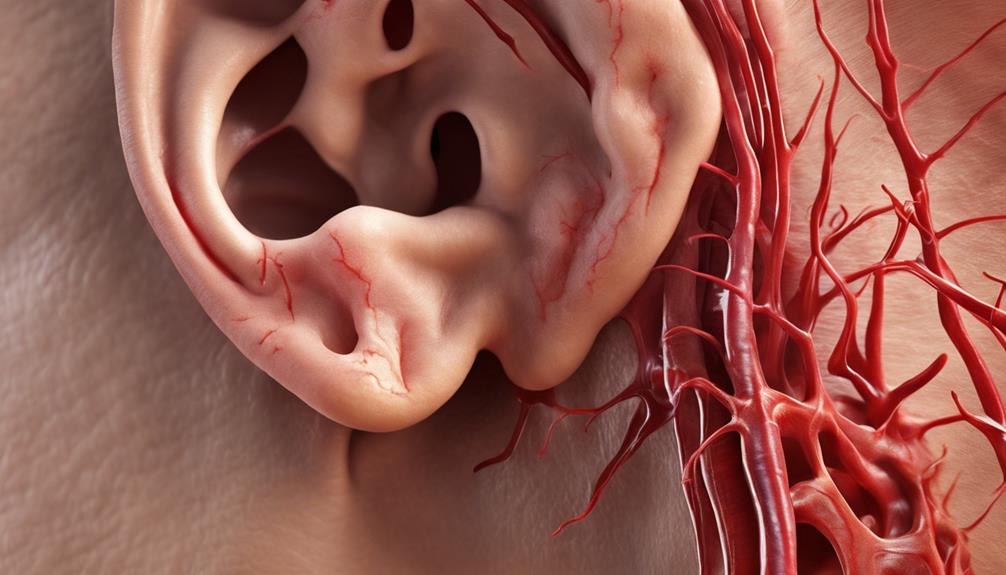
Understanding the impact of inflammation on auditory nerves is crucial in recognizing and addressing potential hearing loss in cancer patients. Cancer-related inflammation, whether caused by the disease itself or treatments like chemotherapy, can harm auditory nerves. This damage can lead to permanent hearing problems as it disrupts the transmission of signals from the inner ear to the brain, affecting one's ability to hear. Monitoring the function of auditory nerves is essential for early detection and intervention to mitigate the effects of inflammation-induced hearing loss.
| Impact of Inflammation on Auditory Nerves | |
|---|---|
| Causes | Cancer, Chemotherapy |
| Consequences | Permanent Hearing Loss |
| Signs | Disrupted Signals |
| Importance | Regular Monitoring |
Blood Flow Disruption in Ear
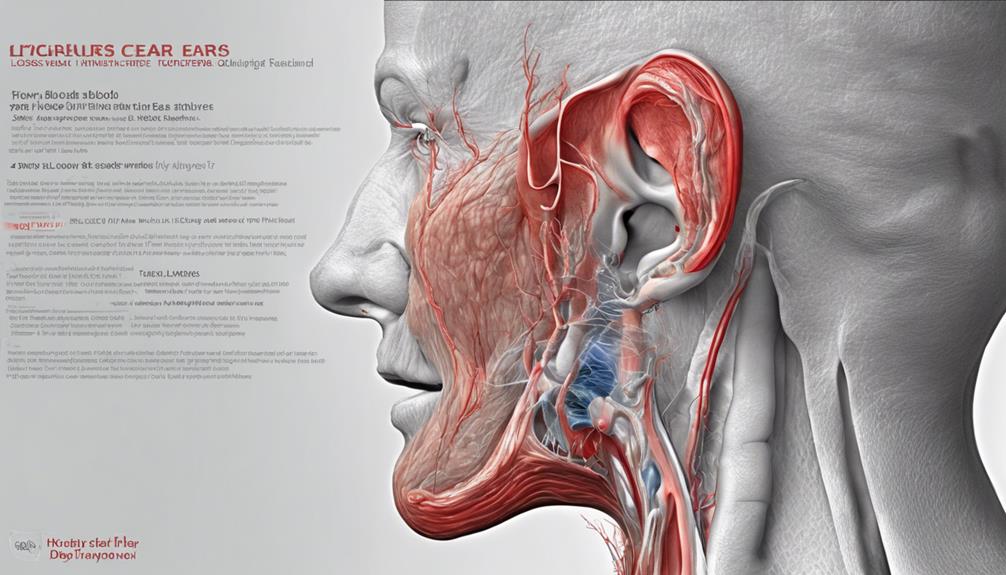
Disruptions in blood flow to the ear can be a significant factor contributing to hearing loss in cancer patients. When blood flow is compromised, the delicate structures of the ear may not receive an adequate supply of oxygen and nutrients, impacting their function and leading to auditory issues.
In the context of cancer, several factors can disrupt blood flow to the ear:
- Tumors in the head and neck region: These growths can exert pressure on the blood vessels that supply the ear, compromising circulation and affecting the inner ear's ability to process sound signals effectively.
- Chemotherapy drugs: While targeting cancer cells, these medications may inadvertently harm the blood vessels in the ear, contributing to hearing loss as an unintended consequence of cancer treatment.
- Radiation therapy: Used in the treatment of head and neck cancers, radiation can cause damage and inflammation in ear tissues, disrupting blood circulation and leading to vascular-related hearing issues.
Understanding these dynamics is crucial in managing potential hearing loss in cancer patients effectively.
Paraneoplastic Syndrome Affecting Hearing
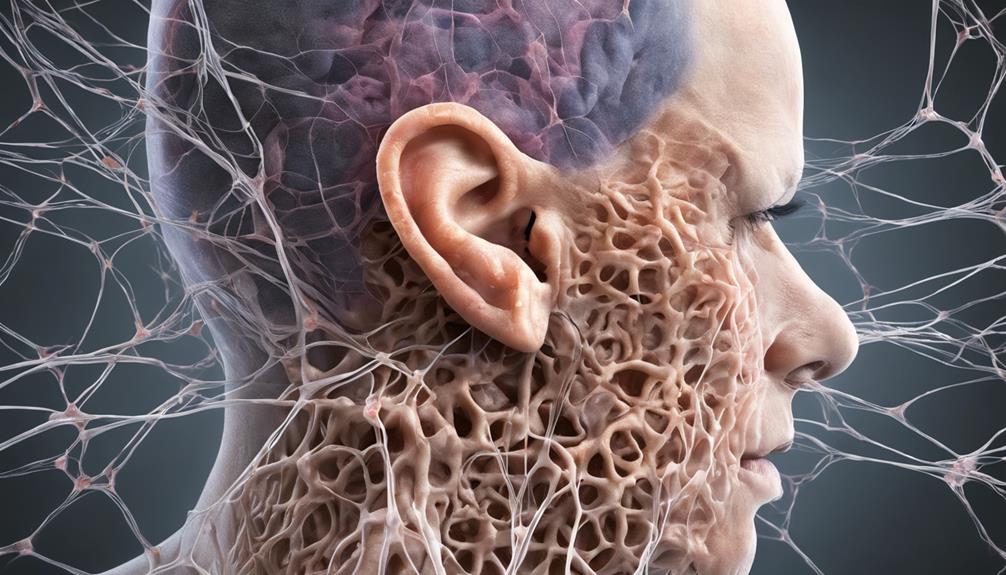
Paraneoplastic syndrome affecting hearing can result in autoimmune reactions damaging the inner ear, leading to hearing loss and balance issues in cancer patients. This rare but serious condition occurs when the body's immune system mistakenly attacks healthy cells in the inner ear, disrupting its normal function. Along with hearing loss, individuals may experience symptoms like vertigo and difficulties with balance, impacting their quality of life. Paraneoplastic syndrome is commonly associated with specific types of cancer such as lung, breast, ovarian, or lymphoma. Diagnosis involves identifying the underlying cancer and managing the autoimmune response to alleviate symptoms. Treatment strategies aim to address the cancer while also addressing the inner ear damage caused by the autoimmune reactions. Managing these complications is essential for improving the overall well-being of cancer patients affected by paraneoplastic syndrome.
| Autoimmune Reactions | Inner Ear Damage | Hearing Loss |
|---|---|---|
| Attack healthy cells | Disrupts function | Impaired |
Side Effects of Targeted Therapy Drugs

Targeted therapy drugs, such as cisplatin, are crucial in cancer treatment but can have significant side effects on hearing. High-frequency hearing loss is a common consequence, impacting the ability to hear specific sounds.
It's essential to be proactive in monitoring hearing changes and communicating them promptly to healthcare providers for appropriate management.
Targeted Therapy Drug Mechanisms
Understanding how targeted therapy drugs like cisplatin and carboplatin can damage inner ear cells responsible for hearing is essential in recognizing and managing potential hearing issues during cancer treatment. When it comes to the mechanisms of these drugs causing hearing loss, there are several key points to consider:
- Some immune-targeted therapies, particularly those used in melanoma treatment, have been linked to hearing loss.
- Chemotherapy-induced hearing loss often impacts high-frequency hearing due to damage to inner ear cells.
- Regular monitoring and early identification of any changes in hearing can play a crucial role in effectively addressing chemotherapy-induced hearing loss.
Common Side Effects
Experiencing side effects from targeted therapy drugs is a common concern for individuals undergoing cancer treatment. Some targeted therapy drugs, like cisplatin or carboplatin, can lead to inner ear cell damage, causing chemotherapy-induced hearing loss. This type of hearing loss typically affects high-frequency hearing and is often seen in gynecological cancers, head and neck cancers, and certain melanoma therapies. Unfortunately, hearing loss induced by these drugs can be permanent, potentially resulting in the need for interventions such as hearing aids. It is essential for individuals receiving targeted therapy drugs to be aware of the risks and potential side effects, allowing for proper monitoring and management of chemotherapy-induced hearing loss.
| Targeted Therapy Drugs | Associated Side Effects | Commonly Seen In |
|---|---|---|
| Cisplatin | Inner ear cell damage, | Gynecological cancers |
| Carboplatin | Chemotherapy-induced hearing loss | Head and neck cancers, |
| Permanent hearing loss | Some melanoma therapies |
Hearing Loss Prevention
As individuals undergoing cancer treatment, it's crucial to be proactive in monitoring for early signs of hearing impairment that may arise from the use of targeted therapy drugs like cisplatin and carboplatin. These drugs can damage the delicate inner ear cells responsible for hearing, particularly affecting high-pitched sounds.
To prevent chemotherapy-induced hearing loss in cancer patients, consider the following strategies:
- Regular monitoring for any changes in hearing abilities during targeted therapy treatment.
- Communication with healthcare providers regarding any concerns or symptoms related to hearing loss.
- Understanding the risk factors associated with targeted therapy drugs to better manage and minimize potential hearing issues.
Being vigilant and proactive can help in addressing hearing loss promptly and effectively.
Impact of Cancer-Related Stress on Hearing

Cancer-related stress can significantly impact hearing by triggering physiological responses that affect the auditory system. Stress hormones like cortisol can interfere with the inner ear structures responsible for hearing function, potentially leading to hearing loss. Chronic stress stemming from cancer can further exacerbate this issue by causing inflammation, oxidative stress, and changes in blood flow that may compromise hearing health. Additionally, the psychological distress and anxiety associated with cancer can worsen existing hearing problems or even precipitate new onset hearing issues. To mitigate the impact of cancer-related stress on hearing, it is essential to employ relaxation techniques, seek counseling, and garner necessary support. By addressing stress management strategies, individuals can potentially alleviate the strain on their auditory system and maintain better hearing health throughout their cancer journey.
| Physiological Responses | Impact on Hearing |
|---|---|
| Stress Hormones | Interfere with inner ear structures |
| Chronic Stress | Causes inflammation, oxidative stress, and changes in blood flow |
| Psychological Distress | Worsens existing hearing problems |
Frequently Asked Questions
How Does Cancer Cause Hearing Loss?
Cancer causes hearing loss by invading auditory nerves or inner ear structures. Tumors in the head and neck can damage auditory nerves, affecting hearing.
Radiation therapy for these cancers can harm delicate ear structures, leading to hearing problems. Chemotherapy drugs may be ototoxic, damaging inner ear hair cells and causing hearing issues.
Metastatic cancer in the middle ear bones can disrupt sound conduction, contributing to hearing loss.
What Are the 4 Major Causes of Hearing Loss?
We know the 4 major causes of hearing loss are:
- Age-related changes
- Exposure to loud noises
- Ear infections
- Genetics
Each factor plays a significant role in affecting our hearing abilities. It's crucial to understand how these elements can impact our hearing health and take proactive steps to protect our ears.
What Can Cause Sudden Hearing Loss?
When sudden hearing loss strikes, various factors may be at play, such as tumors impacting the auditory nerve or inner ear structures, cancer-related inflammation, or chemotherapy drugs like cisplatin and vincristine.
Radiation therapy for head and neck cancers can also lead to this issue.
It's crucial for cancer patients to monitor their hearing closely and discuss any changes with their healthcare team promptly to address potential causes and explore treatment options.
What Are the 3 Types of Hearing Loss?
Sure thing!
So, the three types of hearing loss are conductive, sensorineural, and mixed.
Conductive hearing loss affects the outer or middle ear, while sensorineural stems from inner ear or nerve damage.
Mixed hearing loss combines elements of both.
Knowing the type is key for effective treatment.
Understanding these distinctions helps us provide the best care for those facing hearing challenges.
Conclusion
As we reflect on the various ways cancer can cause hearing loss, it becomes clear that the journey of survivorship isn't without its challenges.
The complexities of how cancer impacts our auditory system are vast and multifaceted, leaving us with more questions than answers. But amidst the uncertainty, one thing remains certain – our resilience and determination to overcome these obstacles.
Stay tuned for more insights on how we can navigate this intricate web of cancer-related hearing issues.



